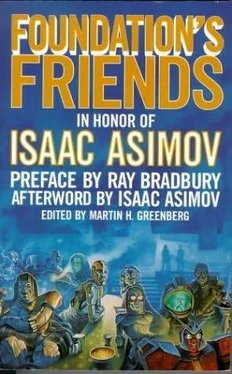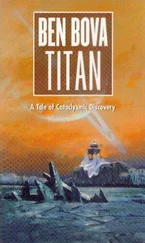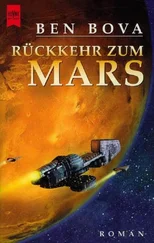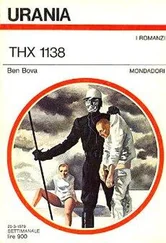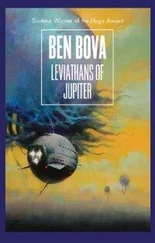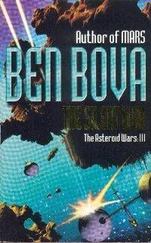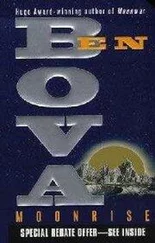Ben Bova - Foundation’s Friends
Здесь есть возможность читать онлайн «Ben Bova - Foundation’s Friends» весь текст электронной книги совершенно бесплатно (целиком полную версию без сокращений). В некоторых случаях можно слушать аудио, скачать через торрент в формате fb2 и присутствует краткое содержание. Год выпуска: 1989, ISBN: 1989, Издательство: Tor Books, Жанр: Фантастика и фэнтези, на английском языке. Описание произведения, (предисловие) а так же отзывы посетителей доступны на портале библиотеки ЛибКат.
- Название:Foundation’s Friends
- Автор:
- Издательство:Tor Books
- Жанр:
- Год:1989
- ISBN:ISBN: 0-312-93174-3
- Рейтинг книги:3 / 5. Голосов: 1
-
Избранное:Добавить в избранное
- Отзывы:
-
Ваша оценка:
- 60
- 1
- 2
- 3
- 4
- 5
Foundation’s Friends: краткое содержание, описание и аннотация
Предлагаем к чтению аннотацию, описание, краткое содержание или предисловие (зависит от того, что написал сам автор книги «Foundation’s Friends»). Если вы не нашли необходимую информацию о книге — напишите в комментариях, мы постараемся отыскать её.
Foundation’s Friends — читать онлайн бесплатно полную книгу (весь текст) целиком
Ниже представлен текст книги, разбитый по страницам. Система сохранения места последней прочитанной страницы, позволяет с удобством читать онлайн бесплатно книгу «Foundation’s Friends», без необходимости каждый раз заново искать на чём Вы остановились. Поставьте закладку, и сможете в любой момент перейти на страницу, на которой закончили чтение.
Интервал:
Закладка:
His words had a double meaning, of course. She had also shown him that their marriage was a dead-end road. Maybe she understood him. Maybe not. It didn’t matter-he had understood her. That little story about a lonely person finally discovering a place where she could be at home-how could he miss the point of that?
“Leyel,” she said. “Why not put your question to the indexers?”
“Do you think the library researchers could find answers where I haven’t?”
“Not the research department. Indexing. “
“What do you mean?”
“Write down your questions. All the avenues you’ve pursued. Linguistic diversity. Primate language. And the other questions, the old ones. Archaeological, historical approaches. Biological. Kinship patterns. Customs. Everything you can think of. Just put it together as questions. And then we’ll have them index it.”
“Index my questions?”
“It’s what we do-we read things and think of other things that might be related somehow, and we connect them. We don’t say what the connection means, but we know that it means something, that the connection is real. We won’t give you answers, Leyel, but if you follow the index, it might help you to think of connections. Do you see what I mean?”
“I never thought of that. Do you think a couple of indexers might have the time to work on it?”
“Not a couple of us. All of us. “
“Oh, that’s absurd, Deet. I wouldn’t even ask it.”
“ I would. We aren’t supervised up here, Leyel. We don’t meet quotas. Our job is to read and think. Usually we have a few hundred projects going, but for a day we could easily work on the same document.”
“It would be a waste. I can’t publish anything, Deet.”
“It doesn’t have to be published. Don’t you understand? Nobody but us knows what we do here. We can take it as an unpublished document and work on it just the same. It won’t ever have to go online for the library as a whole.”
Leyel shook his head. “ And then if they lead me to the answer-what, will we publish it with two hundred bylines?”
“It’ll be your paper, Leyel. We’re just indexers, not authors. You’ll still have to make the connections. Let us try. Let us be part of this.”
Suddenly Leyel understood why she was so insistent on this. Getting him involved with the library was her way of pretending she was still part of his life. She could believe she hadn’t left him, if he became part of her new community.
Didn’t she know how unbearable that would be? To see her here, so happy without him? To come here as just one friend among many, when once they had been-or he had thought they were-one indivisible soul? How could he possibly do such a thing?
And yet she wanted it, he could see it in the way she was looking at him, so girlish, so pleading that it made him think of when they were first in love, on another world-she would look at him like that whenever he insisted that he had to leave. Whenever she thought she might be losing him.
Doesn’t she know who has lost whom?
Never mind. What did it matter if she didn’t understand? If it would make her happy to have him pretend to be part of her new home, part of these librarians-if she wanted him to submit his life’s work to the ministrations of these absurd indexers, then why not? What would it cost him? Maybe the process of writing down all his questions in some coherent order would help him. And maybe she was right-maybe a Trantorian index would help him solve the origin question.
Maybe if he came here, he could still be a small part of her life. It wouldn’t be like marriage. But since that was impossible, then at least he could have enough of her here that he could remain himself, remain the person that he had become because of loving her for all these years.
“Fine,” he said. “I’ll write it up and bring it in.”
“I really think we can help.”
“Yes,” he said, pretending to more certainty than he felt. “Maybe.” He started for the door.
“Do you have to leave already?”
He nodded.
“Are you sure you can find your way out?”
“Unless the rooms have moved.”
“No, only at night.”
“Then I’ll find my way out just fine.” He took a few steps toward her, then stopped.
“What?” she asked.
“Nothing.”
“Oh.” She sounded disappointed. “I thought you were going to kiss me goodbye.” Then she puckered up like a three-year-old child.
He laughed. He kissed her-like a three-year-old-and then he left.
For two days he brooded. Saw her off in the morning, then tried to read, to watch the vids, anything. Nothing held his attention. He took walks. He even went topside once, to see the sky overhead-it was night, thick with stars. None of it engaged him. Nothing held. One of the vid programs had a moment, just briefly, a scene on a semiarid world, where a strange plant grew that dried out at maturity, broke off at the root, and then let the wind blow it around, scattering seeds. For a moment he felt a dizzying empathy with the plant as it tumbled by-am I as dry as that, hurtling through dead land? But no, he knew even that wasn’t true, because the tumbleweed had life enough left in it to scatter seeds. Leyel had no seed left. That was scattered years ago.
On the third morning he looked at himself in the mirror and laughed grimly. “Is this how people feel before they kill themselves?” he asked. Of course not-he knew that he was being melodramatic. He felt no desire to die.
But then it occurred to him that if this feeling of uselessness kept on, if he never found anything to engage himself, then he might as well be dead, mightn’t he, because his being alive wouldn’t accomplish much more than keeping his clothes warm.
He sat down at the scriptor and began writing down questions. Then, under each question, he would explain how he had already pursued that particular avenue and why it didn’t yield the answer to the origin question. More questions would come up then-and he was right, the mere process of summarizing his own fruitless research made answers seem tantalizingly close. It was a good exercise. And even if he never found an answer, this list of questions might be of help to someone with a clearer intellect-or better information-decades or centuries or millennia from now.
Deet came home and went to bed with Leyel still typing away. She knew the look he had when he was fully engaged in writing-she did nothing to disturb him. He noticed her enough to realize that she was carefully leaving him alone. Then he settled back into writing.
The next morning she awoke to find him lying in bed beside her, still dressed. A personal message capsule lay on the floor in the doorway from the bedroom. He had finished his questions. She bent over, picked it up, took it with her to the library.
“His questions aren’t academic after all, Deet.”
“I told you they weren’t.”
“Hari was right. For all that he seemed to be a dilettante, with his money and his rejection of the universities, he’s a man of substance.”
“Will the Second Foundation benefit, then, if he comes up with an answer to his question?”
“I don’t know, Deet. Hari was the fortune-teller. Presumably mankind is already human, so it isn’t as if we have to start the process over.”
“Do you think not?”
“What, should we find some uninhabited planet and put some newborns on it and let them grow up feral, and then come back in a thousand years and try to turn them human?”
“I have a better idea. Let’s take ten thousand worlds filled with people who live their lives like animals, always hungry, always quick with their teeth and their claws, and let’s strip away the veneer of civilization to expose to them what they really are. And then, when they see themselves clearly, let’s come back and teach them how to be really human this time, instead of only having bits and flashes of humanity.”
Читать дальшеИнтервал:
Закладка:
Похожие книги на «Foundation’s Friends»
Представляем Вашему вниманию похожие книги на «Foundation’s Friends» списком для выбора. Мы отобрали схожую по названию и смыслу литературу в надежде предоставить читателям больше вариантов отыскать новые, интересные, ещё непрочитанные произведения.
Обсуждение, отзывы о книге «Foundation’s Friends» и просто собственные мнения читателей. Оставьте ваши комментарии, напишите, что Вы думаете о произведении, его смысле или главных героях. Укажите что конкретно понравилось, а что нет, и почему Вы так считаете.
